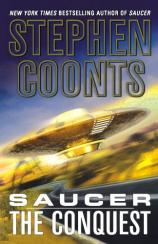Saucer: The Conquest
Review
Saucer: The Conquest
Stephen Coonts has steadily made a name for himself as a go-to guy
for fans of military thrillers. His novel, SAUCER, from two years
ago raised a few eyebrows with its obvious science fiction leanings
but was given a popular welcome by fans of that genre who were not
necessarily familiar with Coonts's military works. SAUCER: THE
CONQUEST is an immensely readable and most welcome sequel to
SAUCER, as well as an indication that Coonts has no intention of
limiting his immense talent to one genre.
All of the protagonists who made SAUCER such an accessible work are
back. The focus is on test pilot Charley Pine, but pilot Rip
Cantrell and his quietly brilliant Uncle "Egg" Cantrell play
important secondary roles. While the relationship between Pine and
Rip that began in SAUCER isn't on the rocks, it has become somewhat
bumpy. Cantrell is content to rest on the laurels and wealth he
acquired during the events in SAUCER. Pine, however, is interested
in new challenges. When a wealthy Frenchman named Pierre Artois
offers her the opportunity to fly an experimental space plane to
the Moon as a co-pilot, Pine jumps at the chance. The enforced
absence grates upon Pine and, more heavily so, upon Rip.
Pine has other things on her mind when she discovers that the
plane's cargo includes a nuclear catalyst for a weapon designed to
hold all of earth hostage to the whim of Artois. Artois believes
that a world government --- with himself, of course, at its head
--- will solve all the earth's problems, and he's not going to give
anyone a say in the matter. Pine manages to escape from the Moon
just as Artois makes his first demand of earth's governments to
disband. France's government predictably accedes almost
immediately. The United States and Britain, on the other hand,
don't act along these lines. Rip and Pine, meanwhile, reunite with
the idea of stopping Artois, saving the earth, and incidentally
rescuing Uncle Egg, who has been kidnapped to the moon by a
half-mad scientist who is in league with Artois and has a saucer of
his own. Pine and Rip "liberate" the saucer that they discovered in
the first book and the festivities begin.
While the success of their mission is rarely in doubt, SAUCER: THE
CONQUEST remains a wild ride. Coonts's science fiction work is
reminiscent of the work of Robert Heinlein, who was often described
as "The Dean of Space Age Fiction." The majority of Heinlein's work
--- those books that preceded STRANGER IN A STRANGE LAND and its
successors --- dealt with the "can do!" attitude of humanity, with
no task being insurmountable. Coonts's protagonists are infused
with this attitude as well, a quality that, along with a wild chase
through the skies (not the streets) of Manhattan, makes SAUCER: THE
CONQUEST a wild and entertaining read.
Coonts leaves enough unresolved issues --- as well as a startling
discovery --- at the end of SAUCER: THE CONQUEST to hint at the
possibility of at least one more novel in the series. While these
books may not be of interest to all readers of Coonts's military
works, they should certainly appeal to fans of old-school science
fiction who fondly recall the genre before it was hijacked by
wookies. Recommended.
Reviewed by Joe Hartlaub on January 23, 2011
Saucer: The Conquest
- Publication Date: August 12, 2004
- Genres: Fiction, Science Fiction
- Paperback: 352 pages
- Publisher: St. Martin's Griffin
- ISBN-10: 031232362X
- ISBN-13: 9780312323622





